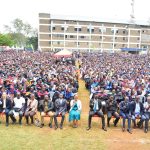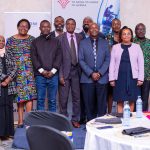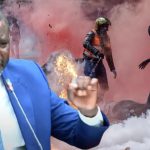
An award-winning Ugandan author who fled the country after being charged with insulting President Yoweri Museveni and his son told AFP Wednesday that he was “relieved” to be in Germany for medical treatment after being “tortured” in jail.
Kakwenza Rukirabashaija was detained shortly after Christmas and later charged with “offensive communication” in a case that has raised international concern, with the European Union and the United States calling for his release. After arriving in Germany on Wednesday, the novelist told AFP about his relief at being saved “from the mouth of the crocodile.”
“I wasn’t safe in Africa since dictators work together to deport dissidents. Now that I’m in Germany, I feel really protected,” he said in a WhatsApp message.
Rukirabashaija, 33, slipped out of Uganda two weeks ago, after a court denied his application to have his passport returned, ahead of a criminal trial that was due to begin on Wednesday. He said he was tortured in custody and appeared on television earlier this month to reveal painful-looking welts criss-crossing his back and scars on other parts of his body.
Rukirabashaija, who was released on bail last month, fled Uganda by walking into neighbouring Rwanda and then travelled to a third country. The UN Refugee Agency then facilitated his journey to Germany, according to his lawyer Eron Kiiza.

The charges against Rukirabashaija relate to unflattering comments on Twitter about Museveni, who has ruled Uganda since 1986, and his powerful son Muhoozi Kainerugaba. In one post, he described Kainerugaba, a general who many Ugandans believe is positioning himself to take over from his 77-year-old father, as “obese” and a “curmudgeon”.
‘Ugandans must be free’
The novelist told AFP earlier this month that he had “been diagnosed with damaged kidneys, bruised ribs and post-traumatic stress disorder.”
He has described being beaten with batons, forced to dance for hours at time, attacked with pliers used to tear at his flesh and injected repeatedly with an unknown substance.
“I’ll get the medical attention I need, then after recovery, decide on the next course of action,” he said Wednesday.
“I’ll have to join the vanguard and we send the dictator and his son who thinks that he’s entitled to proliferate his father’s barbarism — packing. Ugandans must be free in our country.”

Since he fled, Rukirabashaija has been tweeting relentlessly, even becoming embroiled in a Twitter spat with Kainerugaba and branding him a “baby despot.” Rukirabashaija has accused him a of being “in charge” of his torture and instructing him to stop writing, but the general denied the claim.
“I’ve never met him or talked to him and I have no desire to do so,” Kainerugaba tweeted.
Crackdowns
Uganda has witnessed a series of crackdowns aimed at stamping out dissent, with journalists attacked, lawyers jailed, election monitors prosecuted and opposition leaders violently muzzled.
Activists have been repeatedly targeted using the strict Computer Misuse Act which was used against Rukirabashaija and which carries heavy penalties, including jail time.
Outspoken Ugandan activist and writer Stella Nyanzi, who fled to Germany earlier this year, was imprisoned in 2019 under the same law after posting a profane poem about Museveni.
Rukirabashaija won acclaim for his 2020 satirical novel “The Greedy Barbarian”, which describes high-level corruption in a fictional country.
He has been repeatedly arrested since “The Greedy Barbarian” was published and said he was previously tortured while being interrogated by military intelligence.
He was awarded the 2021 PEN Pinter Prize for an International Writer of Courage, which is presented annually to a writer who has been persecuted for speaking out about his beliefs. PEN’s German branch said Rukirabashaija was “under the care of friends and PEN”, adding that he would now be enrolled in its Writers-in-Exile programme which provides grants to authors facing persecution in their home countries.






